Ichalkaranji is majorly known as textile hub and shuttle less city. The Textile Commissioner Office (Ministry of Textiles), DKTE institute, PDEXCIL and Textile Value Chain Media; 4 service industry jointly organised the conference for Industry development on 27th October, 2021 at Conference Hall of Janata Sahakari Bank, New Building Opposite to Ichalkaranji Municipal Corporation, Ichalkaranji between 3pm to 7pm. Entire Conference was Live on YouTube Channel of DKTE institute. View Conference Video
The conference theme was “Export and Market Opportunities for the Ichalkaranji cluster”. The main objective of this conference was to gather all textile manufacturers of Ichalkaranji and give guidance about export and market development.
Conference started by lighting a lamp by Mr. Prakash Awade, MLA- Ichalkaranji; Ms. RoopRashi, Textile Commissioner of India; Ms. Usha Pol, Deputy Director General- Textile Commissioner ; Mr. S P Verma, Joint Textile Commissioner ; Mr. Vishwanath Agarwal, Vice Chairman PDEXCIL and Mr. Sunil Patil, Immediate Past Chairman PDEXCIL.

Dr. P V Kadole, Director of DKTE institute and also director of various organisations and banks, welcomed all the dignitaries and chief guests present while delivering his welcome speech. At the same time, he pointed out that the shortcomings felt by the manufacturer while exporting will be resolved here and the questions raised related export-import will be answered through this program. Direct and Merchant Export know how, many more queries will be answered here.
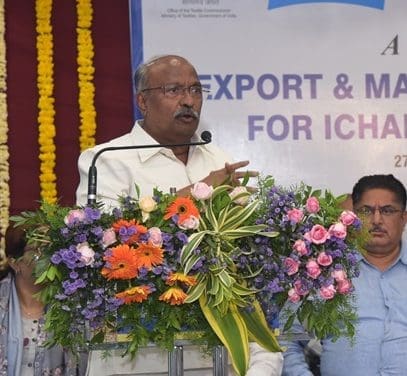
Shri PRAKASH AWADE, MLA- Ichalkaranji, Vice Chairman of DKTE Institute, former Minister of Textiles- Ichalkaranji guided everyone on the subject of Ichalkaranji Cluster and Development. Ichalkaranji Shuttle less City journey started in year 2004, Mr. Awade and his team took lot of efforts to become shuttle less city of India by facing all odds and challenges. Finance challenges are resolved by Kallappa Janta Sahakari Bank, approximately 60 % of the city entrepreneurs has got finance through this bank. New Technology seminars/ exhibitions visited internationally and many more needed education/ skills program given by institutes, government and many private bodies. Today Ichalkaranji has proud to become shuttleless city and set example in India for textile cluster Development. Today all branded International weaving loom company like TSUDAKOMA, PICANOL, ITEMA Weaving etc. have their presence through regional office in Ichalkaranji, this is power of manufacturing development.
After modernisation of weaving technology, next challenge industry faced is sizing and processing ; as Morden weaving loom not supported old sizing machinery. New branded sizing machinery like Karl Mayer, Benninger has also established in Ichalkaranji. For Processing of Fabrics, Entire new plant has set up with Effluent Treat Plant ( ETP) , Zero Liquid Discharge( ZLD).
By working on the plain loom and designing, the manufacturer sells fabric to the merchant exporter and the merchant exporter sells the fabric in his own name, so the main manufacturer left behind.Common Facility Centre needs to be established so every person to sell his fabric at the international level and get a fair price for his fabric.
Mr. Awade also mentioned that they have set up a garment sector in Ichalkaranji, at start 4,500 women had been trained and given stipend in return and due to this training process, today 8000 to 10000 women are working in various garment industries. Ichalkaranji town has 3 lac population, Government criteria of below 5 lac population town , our city has highest per capita income, this is hard working city, 24 hours city works. Survey conducted about “ Rank Cities on Employability (whoever wants work, get it )” in which top ranked is Surat and second rank got Ichalkaranji. Since every person got a job in Ichalkaranji, the per capita income of Ichalkaranji is Rs. 1,70,000 / Year ( highest in India under 5 Lac population Town).
Ichalkaranji is the decentralised top centre not only in Maharashtra, but also in the international arena. Everything is good in Ichalkaranji, but today Ichalkaranji is lagging behind in terms of export, middle chain getting benefits of exports but manufacturer are not. At present, Ichalkaranji has a handful of exporters, but expects this number to increase. The main reason why textile export is not very good in Ichalkaranji is because of working capital. Banks give loans to big industrialists and corporate , but our small entrepreneur or exporters do not get bank loans. TUFS scheme given only to corporate sector , as India’s 62 % fabric produced by decentralised power loom owners , only 6.3% TUFS scheme benefits utilised by decentralised sector, rest benefits are enjoyed by corporates. India’s total textile industry have only 4 % corporates ; 96 % is SME / Decentralised sector which is ignored by ministry of textiles.
Ichalkaranji’s textiles are of good quality, but the export value chain is missing. Due to the suspension of bank finance, the exporters are not getting the desired compensation. Main reason for this is the DGFT, SIDBI schemes which weavers are not benefiting from. The export of Ichalkaranji is expected to reach Rs 10,000 crore in the next 4 years, and by breaking the export chain, every exporter should be able to sell their material directly.
Tirupur Cluster is known for Highest Exporter for Knit Fabrics , same way Ichalkaranji vision is for highest Exporter for Woven fabrics, this is aimed in next 4 years with Rs. 10000 Crores plus exports.
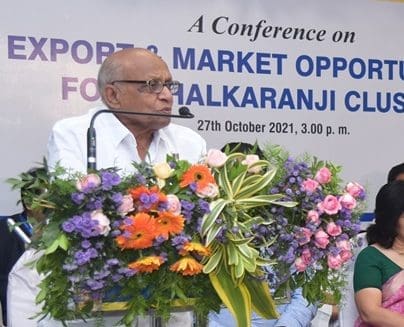
Shri VISHWANATH AGARWAL, Vice Chairman of PDEXCIL stated about power loom industry. India is having 25 lac power looms out of which 13 lacs situated at Maharashtra, more than 50 %. 63 % direct employer, Ichalkaranji has 1,15,000 looms out of which 35000 is shuttle-less / air jet looms. Daily lacs meter has been made in Ichalkaranji and Crores of rupees made, Production quality is good, now processing also in town, now only need export push, schemes which benefits to industry. This town is hard working where people work as per work and not see time. Local leadership of Mr. Awade is good in city which has benefited Ichalkaranji Textile Industry.
PDEXCIL was established in year 1995 and has 2000 members out of which 500 members are from Ichalkaranji. He requested that the exporters want another alternative market so that they can make more profit. Yarn Bank and Powertex scheme need to be back by textile ministry. Exporters did not want financial help from the government but wanted some schemes which would help them to manufacture and sell textiles and make profit with some special concessions which would be beneficial to every exporter.
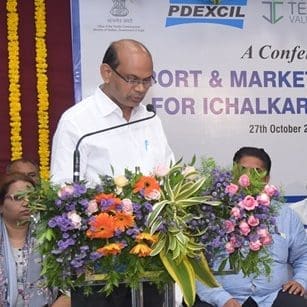 Mr. SURESH DAPODKAR, Foreign Trade Development Officer from DGFT guided everyone on the topic of export opportunities and process.One of the most important step for export is to have import-export code ( IEC), to apply for IEC, only requirement is pan number, a Cancelled Cheque, Bank Certificate and Address Proof , it takes only one day to issue IEC code.
Mr. SURESH DAPODKAR, Foreign Trade Development Officer from DGFT guided everyone on the topic of export opportunities and process.One of the most important step for export is to have import-export code ( IEC), to apply for IEC, only requirement is pan number, a Cancelled Cheque, Bank Certificate and Address Proof , it takes only one day to issue IEC code.
EPCG ( Export Promotion Capital Goods ) Duty Free Import , Duty Exemption scheme. As per scheme whatever amount import , export obligation to fulfil is 6 times as per product description mentioned in list, Export obligation need to fulfil by 50 % in first four years and another 2 years for next 50 % , If not done then need to pay penalty like duty + interest. Detail information has given in Chapter 5 of Foreign trade policy ( FTP). Another scheme mentioned for Advance Authorised Scheme for raw material and components and for import of machine another scheme mentioned. All system is now online, no need of physical visit to office or local office required for processing of anything. Direct Export is easy, suggested to do direct export for benefits of schemes and other incentives.
Mr. Anand Singh, General Manager and In-charge of National Trade and Mr. Vishnu Khanolkar the ECGC’s Branch Manager gave a good presentation on Export Risk and Insurance and guided everyone.
Mr. Anand Singh Started as “No export transaction can take place without payment” . Top 5 exporting country in the world is China, USA, Germany, Japan , S. Korea. Indian ranking is 19th in world export. Awareness of Insurance is very high in these 5 countries. Generally Import is in advance payment term and Export is on Credit terms. If defaulted, then insurance can save you and can do more export. Government of India targeted to achieve 400 million in exports in year 2021-2022. Also, he stated that those who will export should take export credit insurance, which will benefit the exporting class, 237 countries are listed in world import export system.
Mr. Vishnu Khanolkar mentioned ECGC is an organisation that promotes exporters for export and ECGC is working on credit insurance. Khanolkar gave a detailed presentation on the advantages of ECGC, different branches and in-depth information about buyer risk, country risk and credit risk and who benefits from ECGC and how their rates are. ECGC covered the country as well as political risk, which is very important if the exporter wants to do his business without loss.
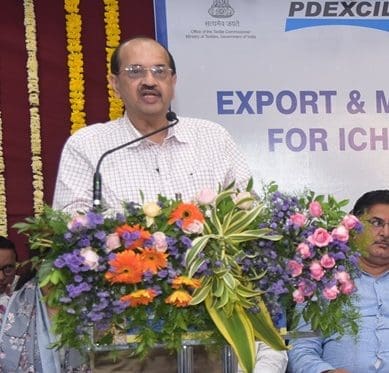
Mr. Sharad Tondan, CEO of Standon Consulting and Advisor of the Yarn Bazaar, Co-founder of Textile Courses Online started his presentation and mentioned he associated in this market from last 17 years and thanked Ichalkaranji for inviting him. He gave a presentation on business growth in export (parde ke piche), in which he said that export grows by selling fabric but it is not enough just to export fabric, many things are required for it.Many people try to export but they don’t succeed, only 3% people succeeded in export. Export order is first step, taking order is easy but getting repeat order is the key. If you really want to start an export business, you have to change yourself first. He also advised the audience on what they should consider before and after exporting.
- Since mindset is a key factor , he clarified the points on what changes should be made if you are ready and how to get started if you are not ready.
- चलताहैनहीचलताl means tolerance level is high, Industry excuse for is “practically not possible’’ but everything is possible , people does it and succeed it.
- What is desired and what is our commitment towards work. Immediate loss need to bear for long term success.
- Textile entrepreneur problem is everything wants to do alone, one man army is easy to run a business alone, but it is very difficult to grow, so it is necessary to develop a good and skilled team.
- Investment is very much needed at the beginning but it will pay off as the business grows.
- Certification is required ISO 9000,GOTS, many more.
- Customer needs Timely delivery , this is major challenge . Services and Communication needs to be fast , how fast you can work on it.
- Exporter competition is not limited to cities but to the whole world.
- Export looks very lucrative but without preparation if you dive in export with luck and without hard work, it will be meaningless.
He is Associated with IACC ( Indo American Chamber of Commerce ), facilitator for India and USA trade, any business activities between two countries are associated can take forward by him.
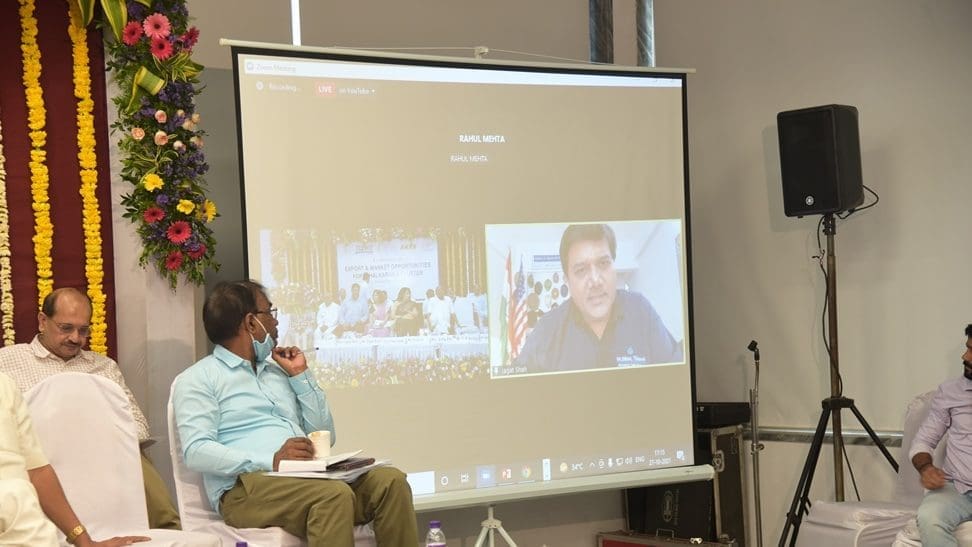
Mr. Jagat Shah, International Market Innovation Advisor; consulting for exporter from15- 20 years, joined everyone through virtual platform and told everyone that if there is knowledge, there will be exports, as well as detailed information on the eco friendly economy, the digital economy, the youthful economy, and finally the work-from-home economy. He stated that world has changed after Covid 19 pandemic today’s economy is different , stated 5 kind of economy exist today in world with abbreviation KEYDW means
K: Knowledge Economy; Knowledge is power and power gives confidence for business.
E : Eco Friendly Economy; Sustainable, recycled, waste products effective utilisation to make world better place to live.
Y : Youth Driven Economy; 65 % of population is below 35 years, India is young, Young India involvement in the business, decision making is the key factor to grow.
D: Digital Economy ; After pandemic 60 % work operation done digitally, Be Smart , Go Digital.
W: Work from Home Economy; Business 3 operations we can do from Home like Marketing, Human Resources and Finance; Save cost by work from home culture and grow.
After understanding Economy of World, understand Export Requirement ie. Preparation and Market.
PREPARATION needs World class website / electronic visiting card, LinkedIn ( professional social media, all importer are in LinkedIn ), Digital Brochure with nicely designed, Design will create brand, innovation will lead, value addition, digital marketing tool ( social media – Instagram as a effective marketing tool ) YouTube channel should have minimum 3 videos like company video, product video and customer benefits video. Your business should be seen everywhere, trade on the online platform even if not physically with everyone. Engaging youngsters in marketing will benefit the business a lot and their ideas will also be useful for the business.
World have more Merchant Exporter due to Export orders generated by trusting Human being ; people work ethics, honesty, integrity, attitude matter most in Export business. After that company integrity, culture, attitude matters, then Product then Price; Price is the last factor to importer consider to give business. Also; marketing , automation, sample presentation matter to few buyers.
MARKET ,to start with Select First 5 countries, collect database, enrol with ECGC for insurance, secure and check credibility, start Digital meetings, set up Marketing budget as an investment , participate in virtual expo ( for lead generation) ware house ( make goods available near to market ) get secure payment, ensure timely delivery , register in B2C portal, tender based import portal, focus, delegate your work, make more system based work.
India is most difficult market, entire world eyeing on India for selling their product ,want to sell product to youth. Managerial, professional and knowledge based approach required for Ichalkaranji market. Young generation join once you give and show value of Industry, its fortunate that Ichalkaranji market have more young generation in business. Entrepreneur Never run business but grows business.
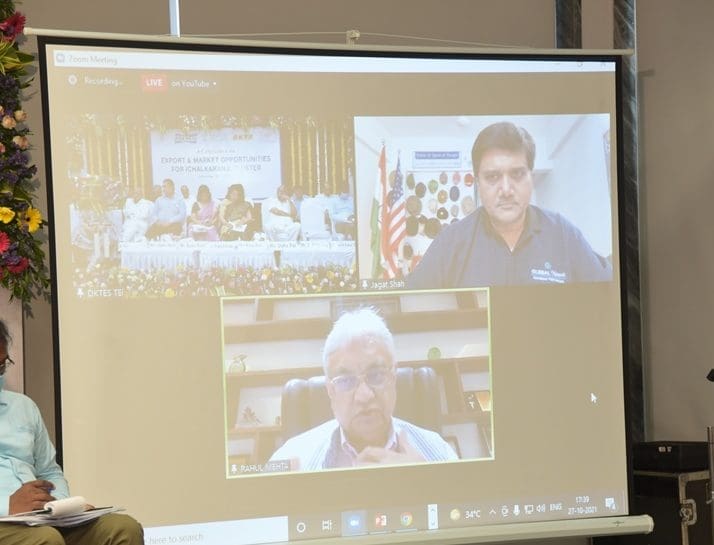
Mr. RAHUL MEHTA, Chief Mentor of CMAI ( Clothing Manufacture Association of India ) joined virtually expressed his thoughts as mentor. He shared his views as a cluster and requirement as follows:
- Branding effort : Branding is an important tool, Create Ichalkaranji Brand, 50 % sales done through brand, as brand has value stand by product , Create own brand personality. As a cluster what speciality , USP, Advantage brand perception have whether some count of quality fabric, finished fabric etc. Make a dedicated website for Ichalkaranji market.
- Constant communication to market : Share innovation, expansion, information to the market. Eg. Surat communication is very fast, once market introduce any new fabric immediately comes to mumbai market within 3-4 days. Online Medium is the best way for communication, communicate with CMAI members , we have members from corporate, retailer, small entrepreneurs , range of members. CMAI can be facilitator for Cluster.
- Online Business : According to survey Online Buying is 5- 6 % of the business it will reach upto 11 % by 2025. Selling online is inexpensive ; need only good e-commerce website, good photographs, good presentation, easy user interface. The quality and quantity of everything is based on the demand of the market, and today, social media handles are becoming very useful for knowing the demand and trend.
- Market Segment Requirement : India’s 60 % population is below 35 years of age, young India needs Cotton feel not purely synthetic fabrics. Digital Savvy youth have more awareness of environment friendly, sustainable product. As per the market ; quantity and variation need to make. Eg. Domestic market buys less quantity may be around 50 pcs per style , but Export market buys quantity like may be minimum 5000 pc per style. Taste, quantity, quality, relevance all important as per market.
CMAI is organising Fabric and Accessories show in Mumbai in month of February, invited Ichalkaranji cluster stake holders to participate. 40000 shuttle less loom, 2,00,000 lac meter processing per day , India’s 5th processing house, Ichalkaranji cluster has lot of potential.
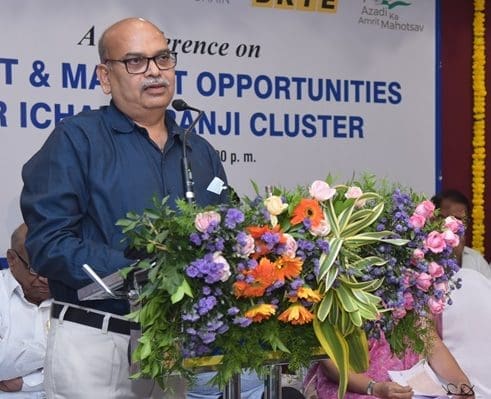
Mr. S. P. VERMA, Joint Textile Commissioner enthuse the audience with his motivational speech and giving examples which he have experienced through out his journey for cluster development. He started by mentioning in year 2004 cluster development started with government support and hard word of the cluster entrepreneurs, each cluster grown in some level.
Ichalkaranji cluster is the most developed cluster in Maharashtra in terms of advance technology, Young man power, enthusiasm, innovation, quality ; cluster only required Confidence, Moral Support, release fear of Export, marketing support/ budget. When cluster buys machine that time don’t think but to run and grow business understanding market and doing correct way of marketing is missing and marketing is lacking everywhere.
He explained and mentioned that there are three gears of success. The first is the Market front, which is the big gear. Market includes Planning of 5 consumer segment identification , mapping of market , need of customer , time of supply, get the feedback, Analysis of product and market. Write Marketing Plan which includes target market, market size, competitive factors etc.
The second is Production (middle gear), in which all the things like Planning, Purchasing Raw Material, Producing Quality, Market Feedback are decided.
The third and last is finance (small gear) which includes Working Capital, Margin / profit of each product, Cash – Cost sheet.
He also shared information about SPANCO CYCLE. SPANCO is an abbreviation of 6 stages of a typical sales cycle which occurs during every sales process. Basic Tool for Marketing suggested by SPANCO cycle :
S– Suspect ( country / agency / mart ) planning / market research – involve with your home , wife and kids give research , data collection etc . Surat has done this, Surat has now 30 % lady entrepreneur. Check HS code , importer, which country, who is doing etc , china is mapping and analysing data from across world.
P– Prospect : after identify market, correct prospect is important , who can buy product and make a buyer as a partner. key success factors strategy : mass production or niche market , market study research in market , mall / retail market ; institutional buyer – railway , CSD
A– Approach : Approaching buyer in a right way through online, offline communication
N– Negotiate terms and conditions.
C– Closing is an art which involves little tactics and strategies.
O – Order , getting PO is the first achievement for business.
Being Cluster development Expert, he shared his views on cluster growth as follows
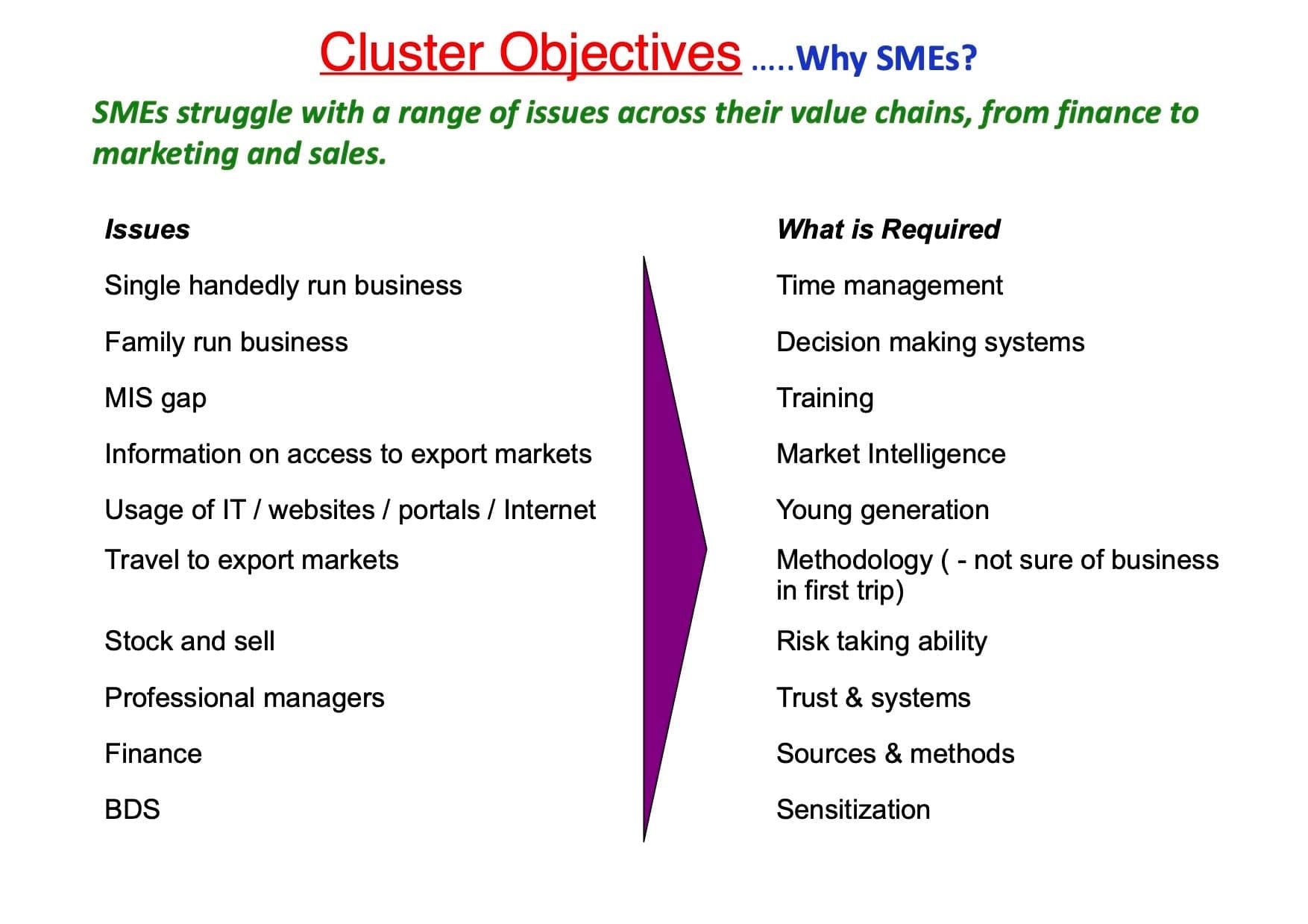
Advantages from Clustering
- Pool of specialised local labour (lower labour costs)
- Competing suppliers of raw material (low input costs)
- Dedicated providers of machinery (faster tech diffusion)
- Economies of scale/scope for service providers
- Responsive support framework
- Dedicated infrastructures created over time
- Mutually reinforcing elements
What is social capital?
- Strength and quality of inter-relationships among cluster stakeholder
- That enables them to work closely together
- It is invariably the least visible of the assets of the cluster, but also the most crucial
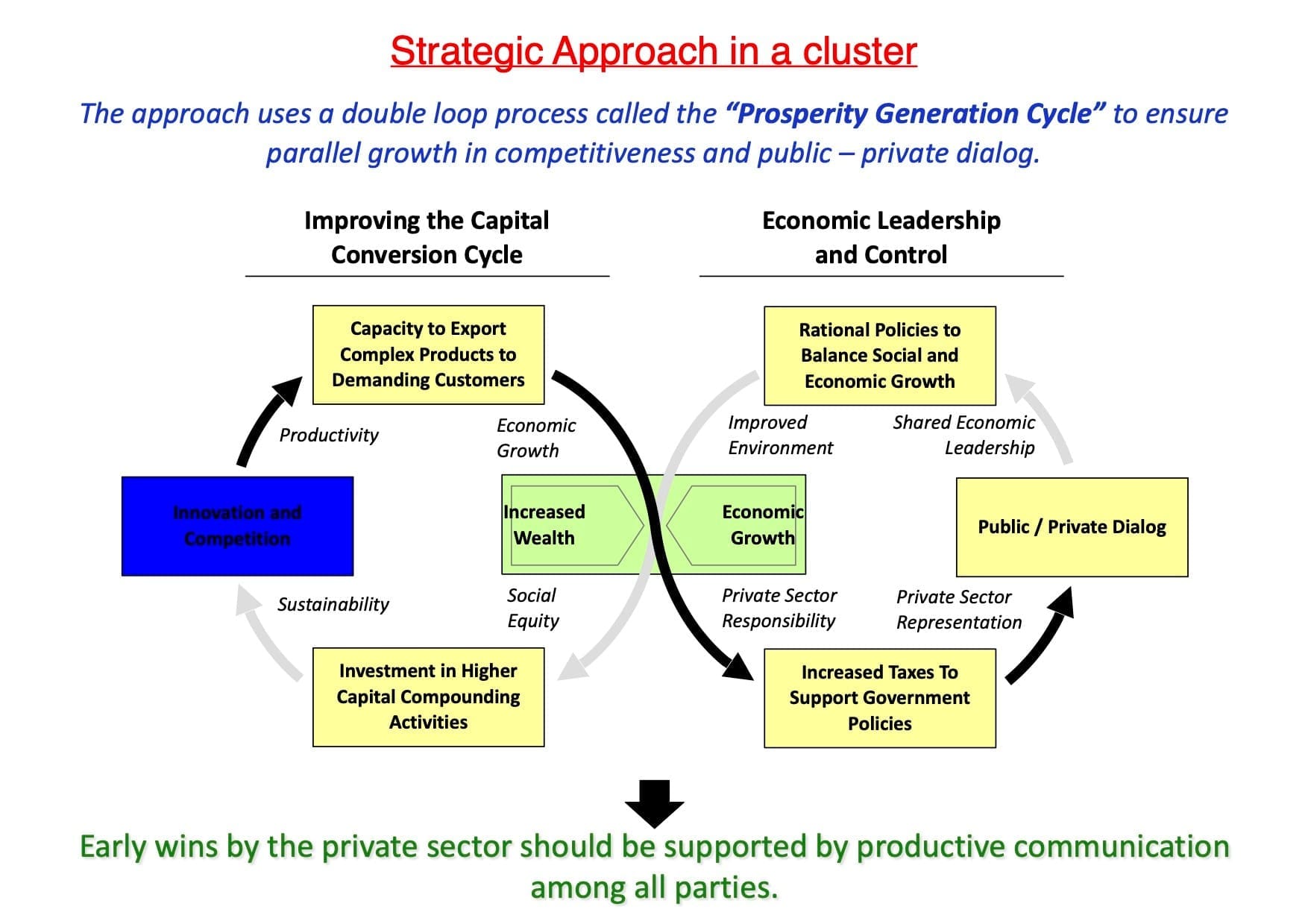
How can social capital help a cluster to develop?
- Foster the level of local economy activity by decreasing risks and focusing expectations
- Improves the character of competition and refocuses it towards innovation and quality
- Facilitates the dissemination of best practice and the absorption of new techniques
- Makes it easier for public and private sector to cooperate in creating and operating infrastructure
A working definition of trust
- Critical level of mutual understanding
- leading to shared expectations and agreed form of behaviour
- within a given group of cluster stakeholders that engage on a common venture to foster their individual benefits
- Strategic approach in a cluster
- Attitude makes everything
Lastly, he stated, “Be a leader, become a leader.” and appealed to go ahead. Making a Cluster as a Company and represent company in international market and get mass production orders from Global market. Kindly write to Mr. Verma on verma.sp@gov.in for any interface, seminar, training requirements.
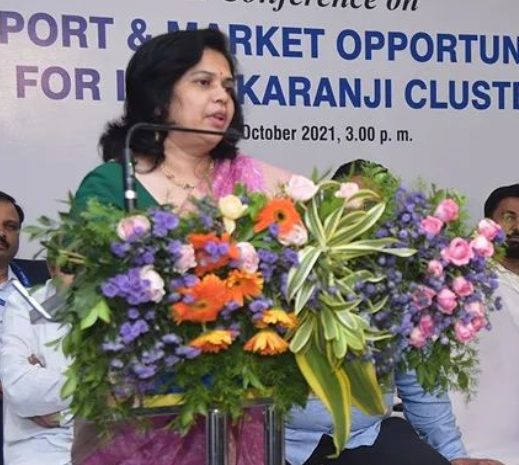 Ms. USHA POL, Deputy Director General, Textile Commissioner, spoken on TUFS – ATUF Scheme Future and TSRS- submission of statistical returns.
Ms. USHA POL, Deputy Director General, Textile Commissioner, spoken on TUFS – ATUF Scheme Future and TSRS- submission of statistical returns.
Starting with background of TUFS from 1999-2015, TUFS benefits were given to different credit linked upgraded machinery etc. ATUFS scheme is from January 2016 to March 2022. Under previous TUFS, 70 percent subsidy was given to non-MSME and only 30 % to MSME/ SSI. Under ATUFS, it’s reversed; almost 80 % of subsidy is being taken by MSME/ SSI and 20 % by non- MSMEs with upper ceilings of subsidy of Rs. 30 crore for Garmenting, Technical Textiles and Rs. 20 crore for other segments.
During 2014, the C&AG conducted the Performance Audit of TUFS which revealed certain lapses in implementation such as release of subsidy to ineligible beneficiaries including non-existent units, investment in machinery which did not meet benchmark technology, and irregularities in subsidy calculation etc. were observed. Taking into consideration the observations of C&AG, the Ministry introduced the Amended Technology Upgradation Funds Scheme (ATUFS) w.e.f. 13.01.2016 with necessary checks and balances incorporated into the GR of ATUFS to strengthen the mechanism of due diligence and verification under the scheme. The scheme aims at augmenting of investment, productivity, quality, employment, exports along with import substitution in the textile industry. The scheme is being implemented and monitored end-to-end through an online iTUFS portal. Further, we are constantly simplifying various processes and formats for reducing compliance burden and facilitate faster processing of claims. Industry suggestions will be very helpful to do so. Further, special measures like introduction of Bank Guarantee scheme, relaxation in various timelines etc. were taken during Covid pandemic to provide relief to the industry. As a result pace of settlement of claims under ATUFS has gained traction and improved significantly in the last 1.5 years.
Textile Statistical Return System (TSRS) – Ms Usha Pralhad Pol ,DDG, provided information about the portal ( http://www.txcindia-stats.gov.in/ ) developed by the Office of the Textile Commissioner, Govt. of India for online submission of Textile Statistical Return System (TSRS) by the textile industry. She requested the participants to impress upon the industry to register in the TSRS portal and submit the Annual and Monthly Statistical Returns as this would help the government to have comprehensive and updated data on textile industry and thereby help the government in making right financial, fiscal and trade policy decisions which would ultimately be in the interest of the textile industry. Further she also said that as the statistical returns are being collected under the Collection of Statistical Act 2008, the data collected under TSRS will be purely for statistical purpose and individual unit need not fear about disclosure of individual unit level statistical data to a third party.
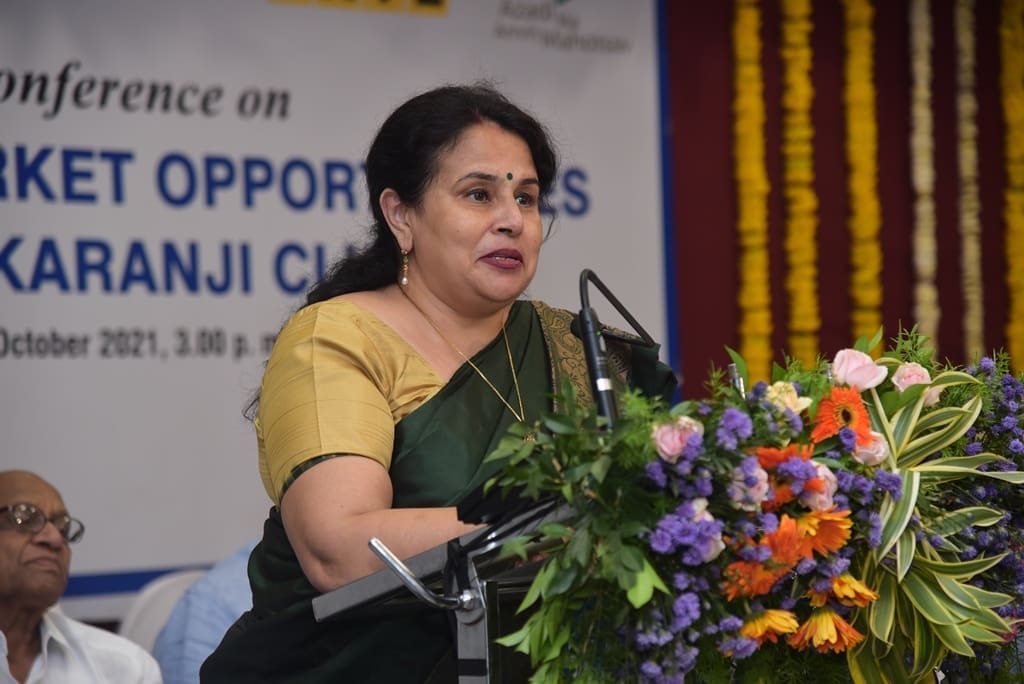
Ms. ROOP RASHI , The Textile Commissioner of India and Chief Guest of the conference started that It’s her first cluster visit after becoming Textile Commissioner of India and she is happy to come and visit the cluster. She is amazed to see growth, all generation is in business of textiles in Ichalkaranji cluster due to leadership and motivation given by Mr. Awade for the development of the cluster and DKTE Institute, also stated that DKTE needs to do more publicity for their quality institute and education.
Vastra Vikas – Approaches for Growth; She stated that Demand of textile will never go whether profit is more or less and insisted on quality products which gets going and it will create new market. Mass Production or Niche always debate / confusion. If Mass market share taken by other giants or other neighbouring countries, niche is the only way to go forward with quality. Be different, make niche product which is not exist in market and create your own market for same, First mover advantage always get you as a leader..
Export not very difficult, market have immense capacity, make your own identity in market and owe your identity, come out of mediocre mentality , make a simple communication that connect with market ( Indian or International , both ) as per requirement. Why only international brand dominates us ?
Textile commissioner office is provider and facilitator between the industry and Government of India, she insisted whatever interfacing required, we are here to support. Banking Sector interface we will plan very soon. We are also in a learning process, face many challenges, support us for smoothen process. Every crisis has an opportunity like Covid 19 made government completely digitalised, paperless office.
Kindly write your suggestions to rashir@cag.gov.in
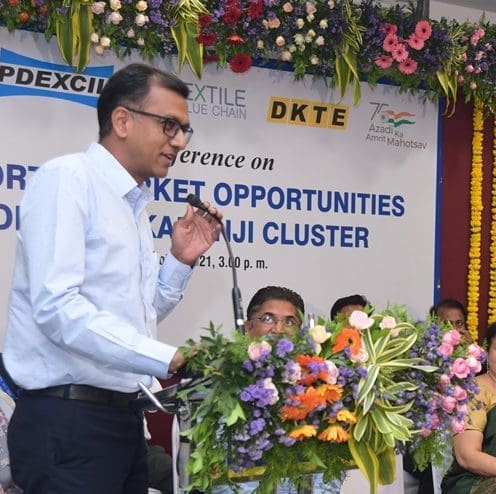
Success Story based in Ichalkaranji, who have already succeeded doing export from Ichalkaranji and won various TEXPROCIL Awards. Mr. Nikunj Bagadia, Ken Enterprise who is doing business from last 3 decades shared his thoughts that he feel gratitude and thanked to Mr. Awade for this cluster building activity and Shuttle less city vision achieved 15000 shuttle less looms which is offering variety of products today to the world. Cluster can compete with Mills better today as mills equipment configured to make certain 5 to 10 products but cluster can offer wide variety ie from 10s count to 120s count, 38 inch to 140 inch width fabric; no mill can offer such a variety in the export market. Few statistics to share is, India’s total dyed fabrics export is 11000 crores, Grey fabrics 2500 crores, printed fabrics is 4000 crores, installation 40000 shuttle less loom in India out of that 30 % is in Ichalkaranji, entire country export Ichalkaranji share is only 3 %, See the potential of the cluster and grab the opportunity.
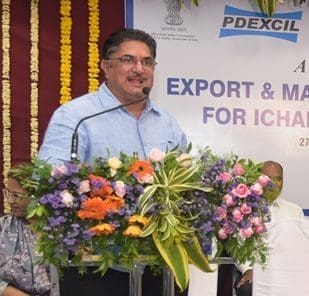 Conference proceeded by Panel Discussion, query from the industry has been resolved; more interactive talks are planed in future to get going and development of the cluster. Conference is concluded by Vote of Thanks given by Mr. Sunil Patil former Chairman of PDEXCIL.
Conference proceeded by Panel Discussion, query from the industry has been resolved; more interactive talks are planed in future to get going and development of the cluster. Conference is concluded by Vote of Thanks given by Mr. Sunil Patil former Chairman of PDEXCIL.
Requirement of the Industry
- Financial institute interface Finance and Loans
- ATUFS benefits to industry , smoothen the process
- DGFT and ECGC involvement in the market
- Production Data addition in Government System
- Constant Push to market , more Export related seminars in industry
- Making a system for cluster, which runs automatically ( block chain / AI system for cluster )
- Social Media Club , below age of 25 years for Export understanding and Marketing
- Making a cluster Fabric brand ( USP of cluster fabric) and represent in national and international market
- Making a dedicated Ichalkaranji cluster information and sourcing website / portal and communicate to national and international market.
- Making a Cluster as a Company and represent company in international market and get mass production orders from Global Market.
Watch Entire Conference here :

